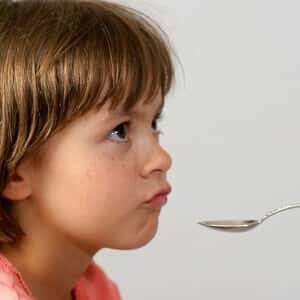
Ask a pediatrician how to treat a child’s cold, and you’ll probably learn that there are few, if any, medicines that speed recovery or even ease symptoms.
Dextromethorphan (abbreviated DM) is the main ingredient in most OTC cough remedies. Despite brisk sales, there is no good evidence that these products are effective for youngsters (Lung, Feb. 2012).
This information is disappointing to parents. When a child is coughing and can’t sleep, there is an overwhelming urge to do something. Home remedies may not be well studied, but they do offer an alternative to OTC medicines that might cause side effects.
Grandmothers have used a teaspoon of honey for decades to ease a cough. Babies under a year should never be given honey, though, because of a risk of botulism. Older children may find it much more pleasant than the bitter taste of dextromethorphan. There is even research to suggest that buckwheat honey might be helpful (Archives of Pediatric and Adolescent Medicine, Dec., 2007; Canadian Family Physician, April, 2011).
Another old-fashioned remedy for children and adults has been around for at least a century. Vicks VapoRub was designed as a cough and cold salve and contains menthol and eucalyptol.
Many people are familiar with the pungent aroma of this ointment applied to the chest for a cough. But some families have been using Vicks on the soles of the feet. One reader told us:
“Just last week, my grandson was staying here and had developed a cough starting that morning. When it didn’t go away, I searched my cabinet for cough medicine, but I was out. I remembered reading about putting Vicks on the soles of the feet and decided to test it out.
“It was unbelievable. He stopped coughing immediately and didn’t cough again until later the next day. I was really impressed.”
Another commented:
“My grandma used Vicks on the bottom of the feet. I am 70, so you know how long ago that was. I swear by Vicks on the feet or the chest but not in the nose.”
Indeed, Vicks should not be used in the nose. Inhaling the petroleum base could lead to lung problems.
Probiotics are usually recommended for gastrointestinal problems. They are supposed to restore a balance of beneficial bacteria to the digestive tract. But they may also be helpful against colds.
A recent study on probiotics found that college students recovered from colds more quickly and missed fewer days of class if they took a powdered probiotic containing Lactobacillus rhamnosus LGG and Bifidobacterium animalis ssp. lactis BB12 rather than a placebo powder (British Journal of Nutrition, online Oct. 1, 2012). A meta-analysis of 10 studies confirmed that probiotic use may be beneficial against the common cold (Cochrane Database of Systematic Reviews, Sept. 7, 2011).
To learn more about cold remedies such as chicken soup (with a special recipe), elderberry, ginger, vitamins C and D, and zinc you may wish to consult our Guide to Colds, Coughs & the Flu, online at PeoplesPharmacy.com.
Researchers are still a long way from finding a cure or even effective treatments for the common cold. In the meantime, though, traditional treatments have the stood the test of time for easing symptoms.
10/11/18 redirected to: https://www.peoplespharmacy.com/articles/how-to-take-care-of-kids-with-colds/

